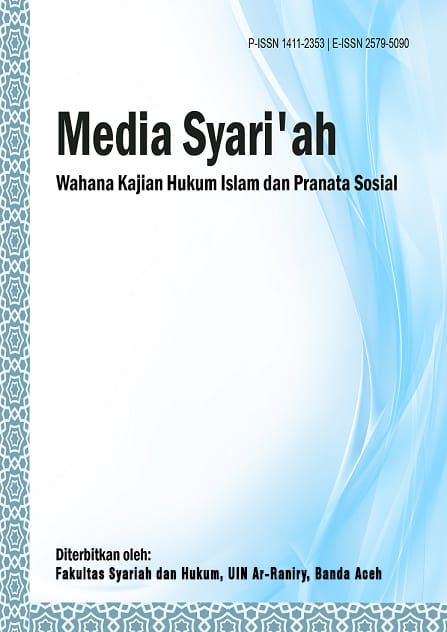Pengaruh Bantuan Kemanusiaan Aceh bagi Pengungsi Rohingnya Terhadap Upaya Diplomasi Kemanusiaan
DOI:
https://doi.org/10.22373/jms.v22i1.6825Keywords:
Humanitarian Diplomacy, Rohingya, Humanitarian Aid, Indonesian Foreign PolicyAbstract
Abstrak : Tulisan ini beranjak dari krisis kemanusiaan yang melanda Rakhine Myanmar yang berimbas pada munculnya arus pengungsi eksternal menuju berbagai negara termasuk Indonesia. Bantuan Kemanusiaan yang diberikan oleh masyarakat Aceh menjadi penting mengingat banyak negara yang menolak kehadiran pengungsi Rohingya ini. Selain itu tulisan ini mencoba mengulas bantuan kemanusiaan Aceh bagi Pengungsi Rohingya serta korelasinya bagi upaya diplomasi kemanusiaan (Humanitarian Diplomacy) Pemerintah Indonesia. tulisan ini juga memaparkan latar belakang bantuan kemanusiaan yang diberikan masyarakat Aceh bagi pengungsi Rohingya serta bentuk-bentuk bantuan yang diberikan. Bantuan kemanusiaan yang diberikan oleh masyarakat Aceh kepada pengungsi Rohingya turut mempengaruhi upaya diplomasi kemanusiaan pemerintah Indonesia. Peran masyarakat aceh yang dalam konteks ini dapat dikatakan sebagai aktor kemanusiaan turut memperkuat sekaligus menegaskan posisi kepemimpinan Indonesia ditingkat kawasan dan global sebagai pendukung perdamaian dunia. Sehingga secara tidak langsung masyarakat Aceh juga menempatkan dirinya sebagai peace supporter yang siap menyokong kebijakan politik luar negeri Indonesia dan yang mengedepankan diplomasi kemanusiaan sebagai langkah strategis menciptakan perdamaian dunia.
Abstract : This paper begins from the humanitarian crisis that struck Rakhine Myanmar which impacted on the emergence of external refugee flows to various countries including Indonesia. Humanitarian assistance provided by the people of Aceh becomes important considering that many countries reject the presence of these Rohingya refugees.
In addition, this paper attempts to review Aceh's humanitarian assistance to Rohingya refugees and their correlation to the Indonesian Government's humanitarian diplomacy. This paper also describes the background of humanitarian assistance provided by the Acehnese people to Rohingya refugees and the forms of assistance provided.
Humanitarian assistance provided by the people of Aceh to Rohingya refugees also influenced the Indonesian government's humanitarian diplomacy efforts. The role of the Acehnese community which in this context can be said is one of a humanitarian actor that also strengthens and emphasizes Indonesia's leadership position at the regional and global level as a supporter of world peace. So that the people of Aceh indirectly in the position as peace supporters who are ready to support Indonesia's foreign policy and who promote humanitarian diplomacy as a strategical step to create peace for entire world.
References
Ambarwati, Denny R dan Rina Rusman (eds). (2010). Hukum Humaniter Internasional dalam Studi Hubungan Internasional. Jakarta: Rajawali
Azwar, Saifuddin. (1998). Metodologi Penelitian, Yogyakarta : Pustaka Pelajar Offset.
Fuat Albayumi, Nourma Meysita Hadi, Djoko Susilo. (2018). “Diplomasi Indonesia dalam Menyelesaikan Krisis Pengungsi Rohingya Tahun 2017”, Nation State: Journal of International Studies, Vol. 1 (2).
ICRC. (2005). Kenali ICRC”. Jenewa
K J. Holsti. 1970. “National Role Conceptions in the study of Foreign policy”.Vol. 14, No. 3
Kelly-Kate Pease,”Human Rights and Humanitarian Diplomacy : Negotiating for Human Rights Protection and Humanitarian Access”, (Manchester : Manchester University Press)
Leedy, Paul D. (1997). Practical Research, Planning and Design, New Jersey : Prentice Hlml,inc.
Ludfiani, Anifa , Abubakar Eby Hara, dan Bagus Sigit Sunarko, “Krisis Kemanusiaan dan Upaya Thailand Mengatasi Gelombang Pengungsi Rohingya. (2017)” Jurnal E-SOSPOL Volume IV Edisi 2, Mei – Agustus
Marelda, Santa. (2011). “Responsibility to Protect: Suatu Tanggung Jawab dalam Kedaulatan Negara”. Jurnal Hubungan Internasional .Vol 2. No.1
Minear, Larry dan Hazel Smith.(2007). Humanitarian Diplomacy : Practitioner and their Craft, Tokyo:United Nations University.
Nazir, Muhammad. (1998). Metode Penelitian. Jakarta : Ghafia Indonesia
Pease, Kelly-Kate . (2016). Human Rights and Humanitarian Diplomacy : Negotiating for Human Rights Protection and Humanitarian Access. Manchester : Manchester University Press
Report of ICSS (International Commission on Intervention and State Sovereignty). (2001). Responsibility to Protect. Canada :International Development Research Centre.
Sugiono, (1999). Metode Penelitian Bisnis, Bandung :CV Alfabeta.
Sugiono, M., & Rosyidin, M. (n.d.). Mengosiasikan yang tidak bisa dinegosiasikan ; menjembatani kepentingan Nasional dan Kepentingan Internasional dalam konsep diplomasi kemanusiaan, diakses tanggal 31 Juli 2019 dari situs www.researchgate.net.
Ula, Syarifatul.(2017). “Peran Aktor Non-Negara dalam Hubungan Internasional: Studi Kasus Human Rights Watch dalam Krisis Kemanusiaan di Myanmar” Journal of International Relations, Volume 3, Nomor 3
Yumitro, Gonda . (2017). “Respon Dunia Internasional Terhadap Tragedi Kemanusiaan Rohingya”. Jurnal Sospol Vol 3 No 2 Juli-Desember
Downloads
Published
Issue
Section
License
MEDIA SYARI'AH: Wahana Kajian Hukum Islam dan Pranata Sosial has CC-BY-SA or an equivalent license as the optimal license for the publication, distribution, use, and reuse of scholarly work. Authors who publish with this journal agree to the following terms:
1. Authors retain copyright and grant the journal right of first publication with the work simultaneously licensed under a Creative Commons Attribution-ShareAlike 4.0 International License that allows others to share the work with an acknowledgment of the work's authorship and initial publication in this journal.
2. Authors are able to enter into separate, additional contractual arrangements for the non-exclusive distribution of the journal's published version of the work (e.g., post it to an institutional repository or publish it in a book), with an acknowledgment of its initial publication in this journal.
3. Authors are permitted and encouraged to post their work online (e.g., in institutional repositories or on their website) prior to and during the submission process, as it can lead to productive exchanges, as well as earlier and greater citation of published work (See The Effect of Open Access).
You are free to:
Share — copy and redistribute the material in any medium or format.
Adapt — remix, transform, and build upon the material for any purpose, even commercially.
The licensor cannot revoke these freedoms as long as you follow the license terms.
All papers published in MEDIA SYARI'AH: Wahana Kajian Hukum Islam dan Pranata Sosial are licensed under a Creative Commons Attribution-ShareAlike 4.0 International License.




.png)


.png)
.png)
.png)



